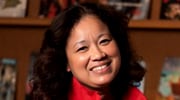Inside the #SpotItToStopIt movement
Conversation with leaders
Women should understand their worth and be assertive
Ros Yusoff
Group Chief Technology & Data Officer, CIMB
Adam Bryant: As a woman in business, what are some headwinds you’ve encountered over your career?
Ros Yusoff: I live in Asia, specifically Malaysia. In this part of the world, the top management levels in technology are still dominated prominently by men. So, there have been times when I’ve felt a bit alone and lonely, to be honest. The journey to where I am today was a result of a series of events where I constantly had to prove myself as being worthy to lead. And I found myself constantly trying to explain my ideas more than my male colleagues. That’s what come to mind on the battles that we had to fight to get to where I am today.
Adam: What are some of the other patterns you’ve noticed?
Ros: I'm in a very fast-moving technology landscape and I must invest a lot of time to keep up with new technologies. I often have found that men could just go into a meeting and explain certain things without really going into the details, whereas I was expected to be able to go deep into the details to build trust and to let people know that I do know what I'm talking about.
Another example of this is, maybe about a decade ago, I went to Japan to teach cryptography to a group of people. I walked into the class, and I was waiting for the attendees, all of whom were men, to join me, when one guy then asked me a question, “Why is the teacher late?” And I responded, “No, your teacher is not late. Your teacher is right here.” They just didn’t think that a woman would be teaching the class.
Adam: Have there been any moments where you felt compelled to talk a person after a meeting because something they said or did cross a line?
Ros: I was in a meeting once where people were asking for opinions and ideas. I found that people were testing me more on my knowledge than a male colleague who was answering similar questions. I then had a conversation with the manager who was in the meeting. I said, “I would like to really understand why my male colleague did not have to go through all these details.” He said to me, “Ros, you want to share information and I know that if I ask these questions, you won't judge me and you would just patiently educate me.” That was the reason he gave, but I did wonder at the time why I was being treated differently than my male colleague.
Adam: Do you feel like progress is being made? Are you optimistic?
Ros: I’m very optimistic, because I’m seeing more women mentoring other women. I have found that if the support system is there, then you will be able to flourish.
Adam: Where does your drive come from? What were important early influences for you?
Ros: When I started primary school, I was about seven years old, and my worst grades were in math. For some reason, being the stubborn person I was, I said that I’m going to learn how to do this. I aced all my math after that, all the way to college. I developed a passion for it.
Adam: When you mentor and coach other women, what advice do you typically share with them?
Ros: Number one, find your allies. And you've got to have a female ally. Second, because I had difficulties early on in negotiating for promotions, salaries etc., I advise other women to develop their negotiation skills, understand their worth, and be assertive. That said, don't try to copy what your male colleagues are doing. You have to recognize your own strengths and you don’t need to do things that are outside of your comfort level. We are multi taskers and while there is negative connotation to it, use it to do things in parallel – recognize your skills, your potential, your worth, and then use it to the best of your abilities. Don’t try to be a man, let them be who they are, and we are who we are!














